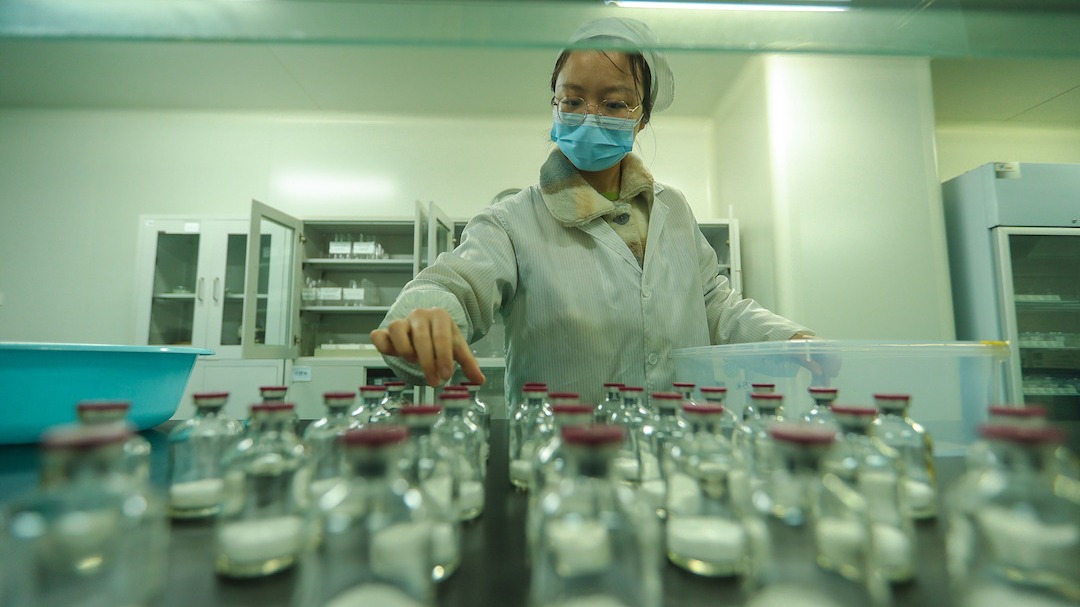Foothold on the continent could give them sway in setting global standards
Chinese pharmaceutical companies are gearing up a foray into Africa with multibillion-yuan investments in local drugmaking facilities, lured by the unmet health care needs of the world’s fastest-growing and most underserved continent.
Wuhan Humanwell Hi-tech Industry Co. Ltd. is the latest Chinese drugmaker to unveil plans to build a factory in Africa. The Shanghai-traded company plans to open a plant to produce mainly psychiatric medications in Morocco, in North Africa, and a commercial company in Chad, a person from Humanwell’s Africa operations told Caixin.
Humanwell has already operated two production facilities in Africa, including a 350 million yuan ($48.9 million) plant that opened in Mali in 2013. The facility, which primarily produces essential medicines, has an annual capacity of 30 million bottles of syrup and 40 million bottles of large-volume injections. In 2017, Humanwell invested 20 million yuan to build a plant in Ethiopia in East Africa to produce oral solids, liquid formulations and small-volume injections.
In 2022, Humanwell’s sales in overseas markets including Africa rose 13.6% to 2.6 billion yuan, accounting for 11% of total revenues.
Shenzhen-based Cheerland Biotechnology, a leading biologics contract development and manufacturing organization, also disclosed a plan to build a production base in North Africa with an annual biomanufacturing capacity of 120,000 liters. The facility is set to start operating in 2024, Cheerland said.
Shanghai Fosun Pharmaceutical Co. Ltd., which runs the largest overseas business among Chinese pharmaceutical companies, earlier this month secured two loans totaling 50 million euros ($54 million) from the World Bank’s International Finance Corp. to fund a project in Cote d’Ivoire. The facility, set to complete the initial phase next year, will have an annual capacity to produce 5 billion tablets of anti-malaria and anti-bacterial drugs, making it the largest drug-producing facility in West Africa.
Africa, a continent with 1.4 billion people, has long relied on imported drugs due to sparse domestic production capacity. According to the African Union Development Agency, about 90% of pharmaceuticals and medical consumables used on the African continent are imported.
According to the World Trade Organization, the import value of pharmaceutical products in Africa increased from $17 billion in 2019, before the pandemic, to $21.8 billion in 2021, representing an expansion of 28% in just two years.
Africa has been experiencing rapid population growth, with its disease burden accounting for one-fourth of the global total. However, pharmaceutical consumption in Africa constitutes only 2% of the world total, making it a region that has long been overlooked by major international pharmaceutical companies, said Markus Genuend, a director of Cheerland.
Medical demand in Africa is rising quickly, but instead of donations and aid, Africa most needs long-term investment by pharmaceutical companies to provide products that are tailored to its needs, Genuend said.
Africa has the potential to become an emerging pharmaceutical growth market, and Chinese drug companies have the opportunity to capitalize by partnering with local governments to build up local supply chains and offer a diverse range of products, he said.
Building a presence in Africa will help China’s independently developed pharmaceutical products to enter the global market and get involved in the establishment of international medical treatment standards, a Fosun Pharma manager said.
A staffer at Humanwell said the company’s business in Africa has focused on essential and affordable medicines in consideration of local people’s limited purchasing power. The new facility in Morocco will expand its product portfolio to cover some higher-end products due to its proximity to the European market.
“In the future, the company will consider investing in active pharmaceutical ingredient factories and research and development centers in North Africa,” the person said.
Running a business in Africa faces challenges such as different production standards applied across the region and political instability, the Humanwell staffer said.
“Our factory in Ethiopia remained idle for nearly a year during the conflict,” the staffer said.
Source: Asia Nikkei

